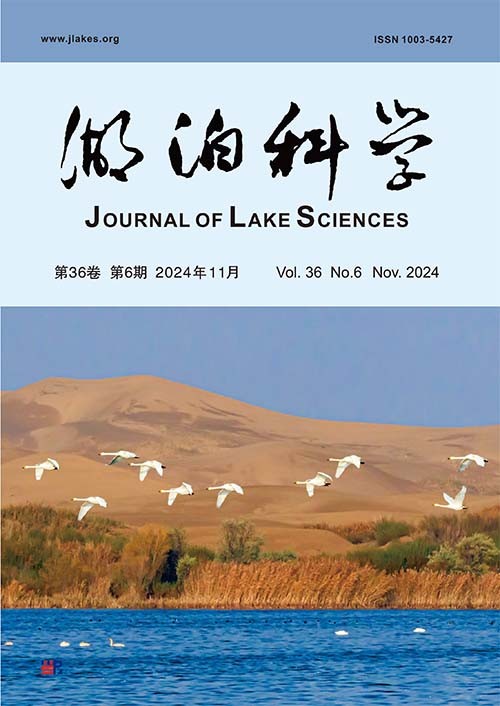Responses of phytoplankton functional groups to water level fluctuations in the Xiangxi Bay, Three Gorges Reservoir
Q2 Earth and Planetary Sciences
引用次数: 1
Abstract
三峡水库每年经历“水位下降(4—5月)-低水位(6—8月)-蓄水(9—10月)-高水位(11月-次年3月)”的季节波动,年水位落差达30 m。为探究香溪河库湾浮游植物功能群对三峡水库水位变化的响应,于2017年对浮游植物群落和主要环境因子开展逐月调查。共检出浮游植物7门65属79种,隶属于21个功能群,其中优势功能群10个,分别为C、D、F、G、J、Lo、M、P、X2、Y。适应营养丰富环境的C、P功能群在全年维持优势,指示香溪河库湾为中-富营养水体。消落期偏好水体扰动较弱、中-富营养水体的功能群(F、G、X2、Y)成为优势类群;汛期偏好稳定富营养、耐受高光强且对冲刷敏感的功能群(G、J、M)成为优势类群;蓄水期和高水位运行期偏好混合的中-富营养水体,耐受低光强且对水体分层敏感的功能群(C、P、D)是优势类群;浮游植物功能类群组成结构随水位变化明显改变。综合营养状态指数表明香溪河库湾在消落期和高水位运行期处于中营养状态,另外两个时期处于富营养状态(39.84≤TSIM≤60.9);Q指数表明香溪河库湾整体水质为“好”(3.02≤Q指数≤4.17);且两者均随着水位下降而降低,表明了水质变差的趋势。RDA分析表明水位不仅直接影响浮游植物功能群,且通过影响总氮、透明度、高锰酸盐指数、电导率、pH值等因子对浮游植物优势功能群及其生物量产生显著影响。本研究证实水位变化对香溪河库湾浮游植物功能群具有显著影响,显示通过水库调度实现对浮游植物调节的可能性。;The water level in Three Gorges Reservoir exhibited drastic change (30 m) within a year, i.e. fall period of water level decrease (April to May), flood period of low water level (June to August), storage period of water level increase (September to October) and high-water period (from November to next March). To study the response of phytoplankton functional groups to changes in water level in Xiangxi Bay (XXB), Three Gorges Reservoir, the characteristics of phytoplankton and physicochemical factors were monitored monthly in 2017. The results showed that phytoplankton species were detected as 7 phyla, 65 genera, 79 species. According to the functional group classification method, the phytoplankton in XXB could be divided into 21 functional groups, among which C, D, F, G, J, Lo, M, P, X2 and Y were the dominant functional groups. C and P functional groups, which are adapted to high nutrient conditions, dominated throughout the year, indicating that XXB was a moderately eutrophic water body. Functional groups (F, G, X2, Y) preferring less disturbed waters and moderately eutrophic waters during the low flow period became dominant taxa; functional groups (G, J, M) preferring stable eutrophication, tolerating high light intensity and being sensitive to scouring during the high flow period became dominant taxa; functional groups (C, P, D) preferring mixed moderately eutrophic waters, tolerating low light intensity and being sensitive to water stratification during the high flow period became dominant taxa. The compositional structure of phytoplankton functional groups changed significantly with water level fluctuations. The comprehensive trophic state index indicated that XXB was mesotrophic during the storage and flood periods, and eutrophic during the other two periods (39.84≤TSIM≤60.9). The ecological status index values indicated that the water quality of XXB was “good”. Both indicated a deterioration in water quality with decreasing water levels. RDA analysis showed that water level not only directly affected the phytoplankton functional group, but also significantly affected the dominant phytoplankton functional group and its biomass through other factors such as total nitrogen, transparency, CODMn, conductivity and pH. The study confirmed that water level fluctuations had a significant effect on the phytoplankton functional group in Xiangxi Bay and demonstrated the possibility of phytoplankton regulation by reservoir operation.三峡库区香溪湾浮游植物功能群对水位波动的响应
三峡水库每年经历“水位下降(4—5月)-低水位(6—8月)-蓄水(9—10月)-高水位(11月-次年3月)”的季节波动,年水位落差达30 m。为探究香溪河库湾浮游植物功能群对三峡水库水位变化的响应,于2017年对浮游植物群落和主要环境因子开展逐月调查。共检出浮游植物7门65属79种,隶属于21个功能群,其中优势功能群10个,分别为C、D、F、G、J、Lo、M、P、X2、Y。适应营养丰富环境的C、P功能群在全年维持优势,指示香溪河库湾为中-富营养水体。消落期偏好水体扰动较弱、中-富营养水体的功能群(F、G、X2、Y)成为优势类群;汛期偏好稳定富营养、耐受高光强且对冲刷敏感的功能群(G、J、M)成为优势类群;蓄水期和高水位运行期偏好混合的中-富营养水体,耐受低光强且对水体分层敏感的功能群(C、P、D)是优势类群;浮游植物功能类群组成结构随水位变化明显改变。综合营养状态指数表明香溪河库湾在消落期和高水位运行期处于中营养状态,另外两个时期处于富营养状态(39.84≤TSIM≤60.9);Q指数表明香溪河库湾整体水质为“好”(3.02≤Q指数≤4.17);且两者均随着水位下降而降低,表明了水质变差的趋势。RDA分析表明水位不仅直接影响浮游植物功能群,且通过影响总氮、透明度、高锰酸盐指数、电导率、pH值等因子对浮游植物优势功能群及其生物量产生显著影响。本研究证实水位变化对香溪河库湾浮游植物功能群具有显著影响,显示通过水库调度实现对浮游植物调节的可能性。;The water level in Three Gorges Reservoir exhibited drastic change (30 m) within a year, i.e. fall period of water level decrease (April to May), flood period of low water level (June to August), storage period of water level increase (September to October) and high-water period (from November to next March). To study the response of phytoplankton functional groups to changes in water level in Xiangxi Bay (XXB), Three Gorges Reservoir, the characteristics of phytoplankton and physicochemical factors were monitored monthly in 2017. The results showed that phytoplankton species were detected as 7 phyla, 65 genera, 79 species. According to the functional group classification method, the phytoplankton in XXB could be divided into 21 functional groups, among which C, D, F, G, J, Lo, M, P, X2 and Y were the dominant functional groups. C and P functional groups, which are adapted to high nutrient conditions, dominated throughout the year, indicating that XXB was a moderately eutrophic water body. Functional groups (F, G, X2, Y) preferring less disturbed waters and moderately eutrophic waters during the low flow period became dominant taxa; functional groups (G, J, M) preferring stable eutrophication, tolerating high light intensity and being sensitive to scouring during the high flow period became dominant taxa; functional groups (C, P, D) preferring mixed moderately eutrophic waters, tolerating low light intensity and being sensitive to water stratification during the high flow period became dominant taxa. The compositional structure of phytoplankton functional groups changed significantly with water level fluctuations. The comprehensive trophic state index indicated that XXB was mesotrophic during the storage and flood periods, and eutrophic during the other two periods (39.84≤TSIM≤60.9). The ecological status index values indicated that the water quality of XXB was “good”. Both indicated a deterioration in water quality with decreasing water levels. RDA analysis showed that water level not only directly affected the phytoplankton functional group, but also significantly affected the dominant phytoplankton functional group and its biomass through other factors such as total nitrogen, transparency, CODMn, conductivity and pH. The study confirmed that water level fluctuations had a significant effect on the phytoplankton functional group in Xiangxi Bay and demonstrated the possibility of phytoplankton regulation by reservoir operation.
本文章由计算机程序翻译,如有差异,请以英文原文为准。
求助全文
约1分钟内获得全文
求助全文
来源期刊

湖泊科学
Environmental Science-Water Science and Technology
CiteScore
3.70
自引率
0.00%
发文量
3253
期刊介绍:
Journal of Lake Sciences (ISSN 1003-5427) was founded in 1989 and is jointly sponsored by Nanjing Institute of Geography and Lake Sciences, Chinese Academy of Sciences and Chinese Society of Oceanology and Limnology. It mainly reports the latest research results on the changes in resources, ecology and environment of lakes (including reservoirs) and their basins under the interaction between man and nature. It publishes theoretical or applied research papers, briefs and reviews on various disciplines related to lake science (such as physics, chemistry, biology, ecology, geology, geography, etc.) as well as lake engineering and integrated basin management. Since 2006, the journal has been changed to a bimonthly publication, published on January, March, May, July, September and November 6 by Science Press.
 求助内容:
求助内容: 应助结果提醒方式:
应助结果提醒方式:


